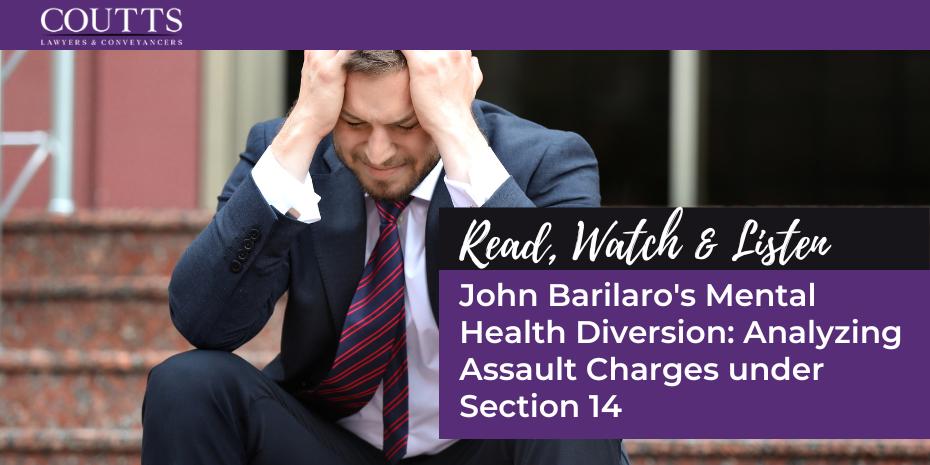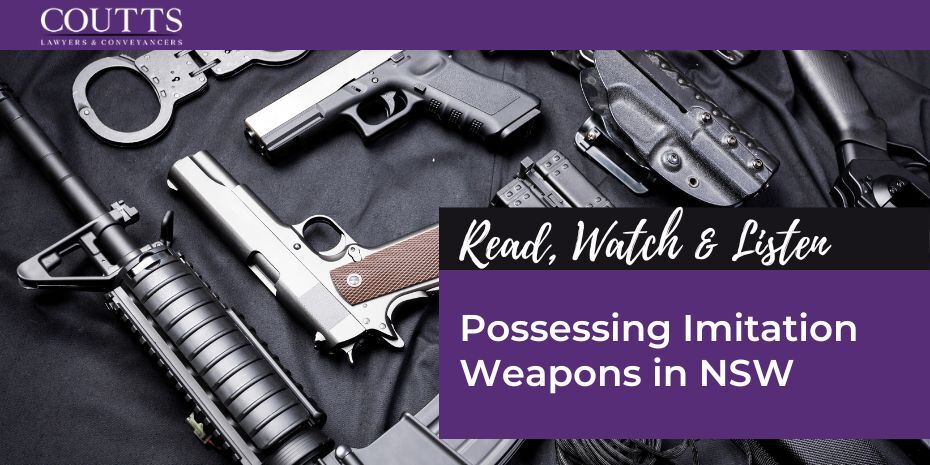Co-authored by: Isabel Strahan
KEY TAKE-OUTS
- Former New South Wales Deputy Premier John Barilaro was charged with assault and malicious damage in August 2022.
- The matter was bought before the Court and his legal representative made an application for the matter to be dealt with under the Mental Health and Cognitive Impairment Forensic Provisions Act 2020.
- The application was successful, and he avoided receiving a criminal record.
- This option may be available to you if you currently face charges for a criminal offence, suffer from a mental or cognitive impairment, and can prove that it is appropriate for the Court to deal with your matter under this section.
In recent news, former New South Wales Deputy Premier, John Barilaro’s assault case has been diverted from the criminal justice system due to Mr Barilaro’s mental health.
Mr Barilaro was charged with assault and malicious damage in August of 2022 after pushing a camera operator and breaking his equipment.
At the time of the assault, Mr Barilaro was suffering from scrutiny over his new appointment and was under a considerable amount of stress.
Mr Barilaro and his legal representation applied to have the matter dealt with under the Mental Health and Cognitive Impairment Forensic Provisions Act 2020, which was not opposed by the prosecution.
In examining the circumstances of the offence, Mr Barilaro’s lawyer positioned his conduct to be at the lowest end of offending behaviour.
He also noted that Mr Barilaro has been diagnosed with Recurrent Depressive Disorder and Anxiety which was compounded by the numerous stressors in his life at the time. Due to this, he was particularly vulnerable to reacting impulsively.
Despite not seeking medical assistance in relation to his mental health concerns prior to the commission of the offence, the Court found that the Section 14 application was successful, and his charges were diverted from the criminal justice system.
What is a Section 14 Application?
Section 14 of the Mental Health and Cognitive Impairment Forensic Provisions Act 2020, allows for a person who has been charged with a criminal offence, that suffers from a mental health or cognitive impairment, to avoid receiving a criminal record or criminal punishment.
The availability for a matter to be dealt with by way of Section 14 intends to ensure that people with a mental health or cognitive impairment who commit a crime can receive treatment in order to prevent reoffending.
If the application is successful, the charges will be dismissed on the condition that the accused participate in a mental health treatment or support plan. Often these plans involve seeing a general practitioner, taking prescribed medication, regularly seeing a psychologist, and actively engaging in therapy. If successful, the plan will be imposed for 12 months.
For a Section 14 to be applicable, you must satisfy the following elements:
- Suffer from a mental health or cognitive impairment, and
- Prove that it is more appropriate for the Court to deal with your matter under this section.
What is Qualified as a Mental Health Impairment?
By legal definition, a mental health impairment is said to include the following:
- A temporary or ongoing disturbance of thought, mood, volition, perception, or memory,
- A disturbance that is significant enough to warrant a clinical diagnosis, and
- A disturbance that impairs your emotional wellbeing, judgment, or behaviour.
For example, if you suffer from anxiety, an affective or psychotic disorder, this would be included in the definition of a ‘mental health impairment’.
If you are found to satisfy the abovementioned criteria, seeking an Order under Section 14 may be available to you.
What is Qualified as a Cognitive Impairment?
A cognitive impairment involves an ongoing impairment in adaptive functioning that relates to comprehension, reason, judgment, learning or memory and is resulting from damage to, dysfunction, developmental delay or the deterioration of the brain or mind.
For example, if you suffer from an intellectual disability, dementia or autism spectrum disorder, you may be found to have a ‘cognitive impairment’.
What Will the Court Look at When Seeking an Order be Made Under Section 14?
In deciding whether to make an Order under Section 14, the Court may look to the following factors that are found in section 15 of the Mental Health and Cognitive Impairment Forensic Provisions Act 2020:
- The nature of your mental health or cognitive impairment,
- The nature, seriousness and circumstances surrounding the offence committed,
- The suitability of a Section 14,
- Your criminal history,
- If you have received a similar Order for a previous offence,
- Whether mental health treatment or support plan has already been prepared for you, and
- Whether you pose as a danger to yourself, the complainant, or other members of the public.
What If a Section 14 Order is Breached?
It is important to note that it is a condition of Section 14 to comply with the mental health treatment or support plan that is given to you. If a Section 14 Order is breached, the previous matter will be brought before the Court again and this option will no longer be available.
Conclusion
The Court’s availability of a Section 14 application recognises that mental health can significantly impair judgement and conduct and as such, needs to be dealt with in a safe and consistent environment. However, successful Section 14 applications require skill, experience, and expertise in navigating the Court system.
If you believe a Section 14 application applies to you, we strongly recommend seeking legal advice as to its suitability. The Criminal Law team at Coutts is dedicated to getting the best outcome for you and our community. Book in an initial consultation and we can discuss the options available to you
ABOUT ISABEL STRAHAN:

Isabel joined the Coutts team in January 2022, as a Paralegal working within our Family & Criminal teams. She is currently studying a Bachelor of Laws and Bachelor of Arts, Majoring in International Relations and Minoring in Cultural Studies at the University of Wollongong. It is her dedication and hardworking nature that will see her go far within Coutts.
For further information please don’t hesitate to contact:
Isabel Strahan
Paralegal
info@couttslegal.com.au
1300 268 887
Contact Coutts today.
This blog is merely general and non-specific information on the subject matter and is not and should not be considered or relied on as legal advice. Coutts is not responsible for any cost, expense, loss or liability whatsoever to this blog, including all or any reliance on this blog or use or application of this blog by you.



